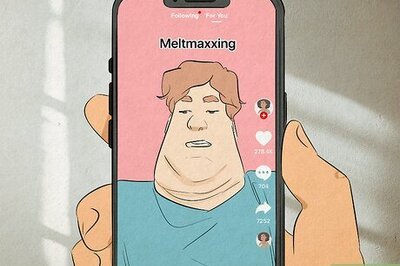
views
Evaluating Your Workload

Evaluate the impact of the various types of work you do. Cut back on work which gives relatively little benefit for the time invested. For any item of work you take on, ask yourself: “How many people will get a significant benefit from this? How many people are eagerly waiting for me to finish this?” If the answer is, “Hardly anyone” think twice or three times about whether you should really do it, or continue with it.

Be efficient in the work you do. If you can be highly productive in a relatively short time, you can use your achievement to calm your workaholic conscience and allow yourself to relax outside your set work time. If you stop being a workaholic, it doesn't mean you can't work hard, work efficiently, and aim for excellent quality. But you set sensible limits on your work so that it doesn't eat up the rest of your life. See How to Work Smart, Not Hard.

Meditate on this: How many people say on their deathbed, “I wish I'd spent more time in the office.” Make it a habit to periodically ask yourself, throughout the day, "If I died in my sleep tonight, would I be happy with the way I spent my day?" As somber as it may sound, looking at your life from the perspective of your deathbed can jolt your priorities into place.

Change your values so that work is no longer the most important thing in your life. Unless you are truly convinced in your heart that there are some other things more valuable than work, it is unlikely the other steps will be effective. You won't be able to say “No” to overtime unless you are sincerely saying “Yes” to something you truly desire. Ask yourself if you value any of the following enough to give them higher priority than your work: Your family. Is your work so important that you would rather risk a divorce and wreck your relationship with your children rather than cut back on your work? Your health. Are you willing to get a stress-related disease and possibly die before retirement because your work is so important? Enjoyment and peace of mind. Workaholics often claim they work so much because they enjoy their work. But if you focus on only one type of enjoyment, you are likely to miss out on the happiness and peace of mind that come with a more balanced lifestyle, with time to nurture meaningful relationships and savor simple pleasures. Money. What's the point of having so much wealth if you don't have time to enjoy it? If you are doing it for the sake of those you love, remember that the gift of time is worth more than the gift of money. Once you have a firm determination to tackle your work addiction, the following steps can help:
Limiting Your Workload

Limit the number of work assignments you accept. Finish one item of work before starting another one. Don't feel that you have to finish every item of work that you have started. Just because you've already wasted a lot of time on a piece of work, it doesn't mean you have to waste more. Don't throw good time after bad. If you have trouble turning down assignments, you may benefit from reading How to Stop Being a People Pleaser and How to Break the "Nice Guy" Stereotype.

Limit the amount of time you spend working. Set aside one day of the week, such as Sunday, as a day of rest. Be strict with yourself in not working on that day. If the computer is your main work tool, try not to use the computer at all on your rest day. Set office hours for yourself, outside of which you don't allow yourself to work. For example, no work before 8 a.m. or after 7 p.m.

Be flexible about when you aim to finish a piece of work. If other people set deadlines for you, so be it. But try not to set deadlines for yourself. Don't do today what you can reasonably put off until tomorrow.

When appropriate, limit the quality of work you aim to achieve. Don't always aim for super high quality work when it isn't necessary to achieve the purpose of the work. As Chesterton said, “If a thing is worth doing, it is worth doing badly.” Especially if that frees up time to do something else even more worthwhile. See How to Control Perfectionism.




















Comments
0 comment